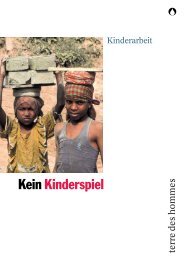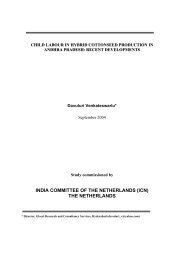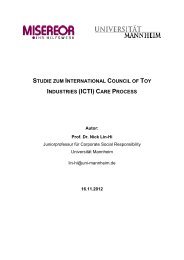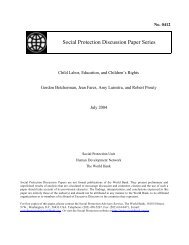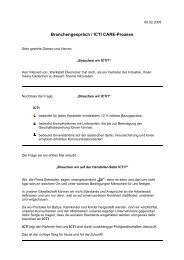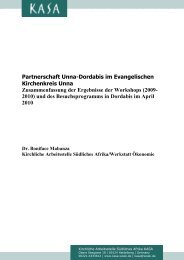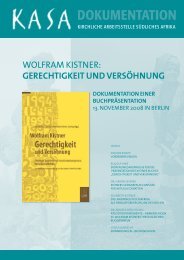Namibia country report
Namibia country report
Namibia country report
- No tags were found...
Create successful ePaper yourself
Turn your PDF publications into a flip-book with our unique Google optimized e-Paper software.
The National Resettlement Policy provides that a number of government ministries shouldcarry a responsibility for co-ordinating action plans in a particular area to ensure thatsectoral partners in government and NGOs are involved with these plans (MLRR 2001a:10). For example, the MLR’s main responsibility is to finance the resettlement programme,while the MAWF is responsible for, among other things, training resettlement beneficiariesthrough its Directorate of Extension Services. However, discussions with beneficiariesand ministry officials in Hardap and Omaheke revealed that a lack of co-ordination andcommunication between these two ministries has often hindered the implementation ofagricultural training programmes for resettlement beneficiaries.Over the years, the MLR has contracted NGOs and donor organisations which offer a widevariety of one-week courses designed to provide knowledge and skills to semi-skilled andunskilled employees and rural communities. For resettlement communities, however, skillstraining has often entailed just a one-off session on basic skills, and there is no data availablefor assessing the effectiveness of these. In addition, the MAWF extension services appear toprioritise the training and service needs of communal farmers, and contract out to privatecontractors the provision of technical services to resettlement projects. This clearly showsthat despite the government’s pledge to empower beneficiaries to become self-sufficient,the beneficiaries have to rely on external services to resolve what is often a minor problem.Beneficiaries at the group schemes of Bernafey, Westfalen, Skoonheid and Drimiopsis statedthat the MLR does not allow them to repair broken equipment themselves, but rather appointsa technical team to undertake repairs, which usually involves hiring private contractors.Land reform support service systems need to be strengthened, or established where theydo not exist. This requires a sound information base and a thorough analysis of agriculturalsupport services, and effective promotion activities for land reform support delivery.Of particular importance will be the linking of the various information sources and theactual exchange of information within the key government institutions and their regionalstructures. This applies mainly to the MLR, the MAWF and Ministry of Environment andTourism, but also to the applicable non-governmental institutions.8.9 Improving infrastructureFinancial co-operation between the government, donor organisations, the NGO sectorand the private sector should be directed to support the development of infrastructurerelating to land reform. Of particular importance will be the poverty-reducing effectsof the infrastructure investments, and broadening and diversifying the scope for ruralproduction. Through the infrastructure provided as well as the promotion of alternativeincome-generating options, resettlement communities will be able to take advantageof new opportunities and comparative benefits based on different resource endowments.Land reform beneficiaries need assistance with appropriate infrastructure in their effortsto generate sustainable increases in production in both the crop and livestock farming subsectors.176 ● Livelihoods after land reform: <strong>Namibia</strong> <strong>country</strong> <strong>report</strong> (2010)




